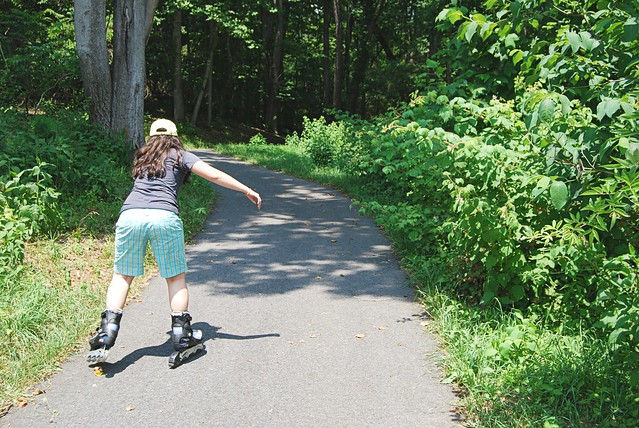Read Our Blogs
Get Ticked Off!
Posted April 9, 2012 | Updated June 10, 2017
When you visit a Virginia State Park there are one or two things we hope you won't take home with you.
A visit to a Virginia State Park is full of family fun, whether you are hiking, picnicking, camping, boating, fishing...you will bring home many memories. A visit to one of our park gift shops offers a cute souvenir of your visit. But one thing you won't want as a souvenir are ticks, or tick bites.
Stay on the trail, and preferably stick to the middle to avoid ticks
Yes, it's that time again. Warm and hot weather makes ticks more active and it's more likely you will inadvertently take one home with your after an outdoor visit.
If you are aggressive with checking for ticks after outside work and play, you should bring home only fond memories of your outdoor adventures.
No this isn't a tick, I couldn't find a photo, so this is a Shamrock spider (an arachnid like a tick)
Stay on the trails, steer clear of overgrown vegetation and grasses
PLAN AHEAD
What things can we do in preparation of getting outside this summer at our favorite Virginia State Parks? Let look at a few irritating factors and what we can do to prepare:
Ticks, I hate them, you hate them, and we all hate them. Unfortunately they are a part of the great outdoors here in Virginia. One Health Official shared:
The tick population is increasing in Virginia, along with diseases borne by the insects.
Wet weather and a rise in the rodent population are some of the factors in tick population surge. Wet weather leads to more foliage and ticks like tall grass or tall weeds near forested areas. Woodpiles attract rodents that commonly host ticks. Some believe they are also spread by birds and squirrels.
Learn more about Tick-borne diseases in Virginia here.
WHAT WE CAN DO
Ticks are extremely small insects classified as arachnids with spiders and mites. Ticks are found usually living in areas with overgrown grass and near water.
- Wearing protective clothing when hiking (tuck your pant legs into your socks), don't wear open toed shoes.
- Spray bug repellent.
- Don't let the kids run through the tall grass in the parks, stay on the trails.
- Protect your pet using Frontline Plus or another proven repellent for ticks.
- Do a daily tick inspection. Check yourself and your clothing for ticks. One of the better ways to do a tick check is in the shower, or bathroom with a mirror. Prompt removal of attached ticks can prevent some infections.
OBNOXIOUS INSECTS
Mosquitoes are pesky critters, some of us are targeted as blood donors for these nasty blood suckers. Protect yourself and your family using insect repellent and cover up when you can with long sleeves especially when hiking. Wear light colored, long and loose fitting clothing as much as possible:
Color is important
Mosquitoes are attracted to dark colors
FIRST AID KITS
If you happen to land in poison ivy, be sure to scrub scrub scrub to get the oils off your skin (between your fingers, and other places you may have touched with your hands). That is the best method for stopping the spread.
Roller blading at Claytor Lake State Park is great fun on the trail
But be careful or you may fall into poison ivy or ticks in the grass off the trail
Nothing ruins a vacation faster than a terrible sun burn. You have heard all the warnings about skin cancer, it is just not worth it. Protect your family with the highest sunscreen available. Wear a hat.
Find a place that is out of direct hot sunlight and relax for a few moments. If on a beach bring an umbrella so you have a shady spot and sun reprieve.
Keep an eye on the kids, they usually won't know when they have had too much sun.
Better yet, when you feel like you've had too much sun
Get out of the sun
Thirst signals that you are dehydrated, and even mild dehydration can sap your energy and turn a fun hike into an ordeal. All the fun in the sun makes us thirsty, but who wants to leave the water to go get a drink? Refuel your family. It is a lot easier to stay hydrated than to reverse dehydration, because if you are sweating heavily and become dehydrated, you may be losing water faster than your body can absorb the liquid you drink. In order to prevent dehydration, which can cause life-threatening shock in severe cases, it is vital to replenish both the water and the electrolytes (salts) that your body loses through sweat. Bring plenty of water and other electrolyte replacements such as Gatorade.
You may think little Billy is just being cranky
But he might be getting dehydrated
PETS
Don't forget Fido, the best idea for ticks and fleas is a preventative treatment such as Frontline Plus, or similar, for flea and tick control. The same rules apply to your family pet for dehydration, keep them in the shade with plenty of water. They can also be injured going off the trail in shrubbery or even trip on rocks.
Virginia State Parks are pet friendly, but when we get busy having fun in the sun we may forget they have important needs as well.
Staff learn the scoop rescue technique during training
ASK FOR HELP
Being prepared before you head outside can make all the difference when you visit a Virginia State Park. If you encounter something beyond a minor bite or scrape be sure to immediately ask for help, as someone can contact the nearest park staff for assistance. Staff are there to help, and trained for emergencies.
PLAN YOUR FUN
There are 37 Virginia State Parks to choose from, click here to learn more. We want you to enjoy your visit to your favorite Virginia State Park, be proactive and get ticked off before you face the elements.
Here is a list of parks offering swimming this summer, and overnight accommodations in cabins, or camping here.
If you have read the article and have a question, please email nancy.heltman@dcr.virginia.gov.
Search for blogs
By Park
Categories
Cabins
Camping
Fishing
History and Culture
Other
Programs and Events
Trails
Volunteers
Water Fun
Archive
2025
2024
2023
2022
2021
2020
2019
2018
2017
2016
2015
2014
2012





















